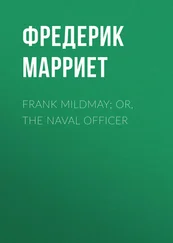Фредерик Марриет - The Pirate
Здесь есть возможность читать онлайн «Фредерик Марриет - The Pirate» — ознакомительный отрывок электронной книги совершенно бесплатно, а после прочтения отрывка купить полную версию. В некоторых случаях можно слушать аудио, скачать через торрент в формате fb2 и присутствует краткое содержание. Жанр: foreign_prose, literature_19, foreign_antique, на английском языке. Описание произведения, (предисловие) а так же отзывы посетителей доступны на портале библиотеки ЛибКат.
- Название:The Pirate
- Автор:
- Жанр:
- Год:неизвестен
- ISBN:нет данных
- Рейтинг книги:3 / 5. Голосов: 1
-
Избранное:Добавить в избранное
- Отзывы:
-
Ваша оценка:
- 60
- 1
- 2
- 3
- 4
- 5
The Pirate: краткое содержание, описание и аннотация
Предлагаем к чтению аннотацию, описание, краткое содержание или предисловие (зависит от того, что написал сам автор книги «The Pirate»). Если вы не нашли необходимую информацию о книге — напишите в комментариях, мы постараемся отыскать её.
The Pirate — читать онлайн ознакомительный отрывок
Ниже представлен текст книги, разбитый по страницам. Система сохранения места последней прочитанной страницы, позволяет с удобством читать онлайн бесплатно книгу «The Pirate», без необходимости каждый раз заново искать на чём Вы остановились. Поставьте закладку, и сможете в любой момент перейти на страницу, на которой закончили чтение.
Интервал:
Закладка:
“I presume that you do not intend to make the child your heir, which I should consider as highly improper; and, indeed, Lady Betty tells me that the legacy-duty is ten per cent, and that it cannot be avoided. However, I make it a rule never to talk about these sort of things. As for your request that I will come up and superintend your establishment, I have advised with Lady Betty on the subject, and she agrees with me that, for the honour of the family, it is better that I should come, as it will save appearances. You are in a peck of troubles, as most men are who are free-livers and are led astray by artful and alluring females. However, as Lady Betty says, ‘the least said, the soonest mended.’
“I will, therefore, make the necessary arrangements for letting my house, and hope to join you in about ten days; sooner, I cannot, as I find that my engagements extend to that period. Many questions have already been put to me on this unpleasant subject; but I always give but one answer, which is, that bachelors will be bachelors; and that, at all events, it is not so bad as if you were a married man: for I make it a rule never to talk about, or even to hint about, these sort of things, for, as Lady Betty says, ‘Men will get into scrapes, and the sooner things are hushed up the better.’ So no more at present from your affectionate sister,
“Margaret Witherington.
“PS. Lady Betty and I both agree that you are very right in hiring two black people to bring the child into your house, as it makes the thing look foreign to the neighbours, and we can keep our own secrets.
“M.W.”
“Now, by all the sins of the Witheringtons, if this is not enough to drive a man out of his senses!—Confound the suspicious old maid! I’ll not let her come into this house. Confound Lady Betty, and all scandal-loving old tabbies like her! Bless me!” continued Mr Witherington, throwing the letter on the table with a deep sigh, “this is anything but comfortable.”
But if Mr Witherington found it anything but comfortable at the commencement, he found it unbearable in the sequel.
His sister Moggy arrived, and installed herself in the house with all the pomp and protecting air of one who was the saviour of her brother’s reputation and character. When the child was first brought down to her, instead of perceiving at once its likeness to Mr Templemore, which was very strong, she looked at it and at her brother’s face with her only eye, and shaking her finger, exclaimed—
“Oh, Antony! Antony! and did you expect to deceive me?—the nose—the mouth exact—Antony, for shame! fie, for shame!”
But we must hurry over the misery that Mr Witherington’s kindness and benevolence brought upon him. Not a day passed—scarcely an hour, without his ears being galled with his sister’s insinuations. Judy and Coco were sent back to America; the servants, who had remained so long in his service, gave warning one by one, and afterwards, were changed as often almost as there was a change in the moon. She ruled the house and her brother despotically; and all poor Mr Witherington’s comfort was gone until the time arrived when Master Edward was to be sent to school. Mr Witherington then plucked up courage, and after a few stormy months drove his sister back to Bath, and once more found himself comfortable.
Edward came home during the holidays, and was a great favourite; but the idea had become current that he was the son of the old gentleman, and the remarks made were so unpleasant and grating to him, that he was not sorry, much as he was attached to the boy, when he declared his intention to choose the profession of a sailor.
Captain Maxwell introduced him into the service; and afterwards, when, in consequence of ill health and exhaustion, he was himself obliged to leave it for a time, he procured for his protégé other ships. We must, therefore, allow some years to pass away, during which time Edward Templemore pursues his career, Mr Witherington grows older and more particular, and his sister Moggy amuses herself with Lady Betty’s remarks and her darling game of whist.
During all this period no tidings of the boats, or of Mrs Templemore and her infant, had been heard; it was therefore naturally conjectured that they had all perished, and they were remembered but as things that had been.
Chapter Six.
The Midshipman
The weather side of the quarter-deck of H.M. frigate Unicorn was occupied by two very great personages: Captain Plumbton, commanding the ship, who was very great in width if not in height, taking much more than his allowance of the deck, if it were not that he was the proprietor thereof, and entitled to the lion’s share. Captain P was not more than four feet ten inches in height; but then he was equal to that in girth: there was quite enough of him, if he had only been rolled out . He walked with his coat flying open, his thumbs stuck into the arm holes of his waistcoat, so as to throw his shoulders back and increase his horizontal dimensions. He also held his head well aft, which threw his chest and stomach well forward. He was the prototype of pomposity and good nature, and he strutted like an actor in a procession.
The other personage was the first lieutenant, whom Nature had pleased to fashion in another mould. He was as tall as the captain was short—as thin as his superior was corpulent. His long, lanky legs were nearly up to the captain’s shoulders; and he bowed down over the head of his superior, as if he were the crane to hoist up, and the captain the bale of goods to be hoisted. He carried his hands behind his back, with two fingers twisted together; and his chief difficulty appeared to be to reduce his own stride to the parrot march of the captain. His features were sharp and lean as was his body, and wore every appearance of a cross-grained temper.
He had been making divers complaints of divers persons, and the captain had hitherto appeared imperturbable. Captain Plumbton was an even-tempered man, who was satisfied with a good dinner. Lieutenant Markitall was an odd-tempered man, who would quarrel with his bread and butter.
“Quite impossible, sir,” continued the first-lieutenant, “to carry on the duty without support.”
This oracular observation, which, from the relative forms of the two parties, descended as it were from above, was replied to by the captain with a “Very true.”
“Then, sir, I presume you will not object to my putting that man in the report for punishment?”
“I’ll think about it, Mr Markitall.” This, with Captain Plumbton, was as much as to say, No.
“The young gentlemen, sir, I am sorry to say, are very troublesome.”
“Boys always are,” replied the captain.
“Yes sir: but the duty must be carried on, and I cannot do without them.”
“Very true—midshipmen are very useful.”
“But I am sorry to say, sir, that they are not. Now sir, there’s Mr Templemore; I can do nothing with him—he does nothing but laugh.”
“Laugh!—Mr Markitall, does he laugh at you?”
“Not exactly, sir; but he laughs at everything. If I send him to the mast-head, he goes up laughing; if I call him down, he comes down laughing; if I find fault with him, he laughs the next minute: in fact, sir, he does nothing but laugh. I should particularly wish, sir, that you would speak to him, and see if any interference on your part—”
“Would make him cry—eh? better to laugh than cry in this world. Does he never cry, Mr Markitall?”
“Yes, sir, and very unseasonably. The other day, you may recollect, when you punished Wilson the marine, whom I appointed to take care of his chest and hammock, he was crying the whole time; almost tantamount—at least an indirect species of mutiny on his part, as it implied—”
Читать дальшеИнтервал:
Закладка:
Похожие книги на «The Pirate»
Представляем Вашему вниманию похожие книги на «The Pirate» списком для выбора. Мы отобрали схожую по названию и смыслу литературу в надежде предоставить читателям больше вариантов отыскать новые, интересные, ещё непрочитанные произведения.
Обсуждение, отзывы о книге «The Pirate» и просто собственные мнения читателей. Оставьте ваши комментарии, напишите, что Вы думаете о произведении, его смысле или главных героях. Укажите что конкретно понравилось, а что нет, и почему Вы так считаете.












